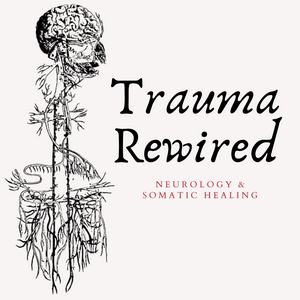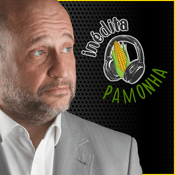268 episódios

Post Traumatic Growth Starts With Self Attunement
12/1/2026 | 55min
What if the places we have been hurt most, our relationships, can also become the places where we grow? In this episode, we explore relational healing as a powerful driver of post-traumatic growth. Together, we unpack why safe connection can feel threatening after complex trauma, how protective patterns like fight, freeze, and fawn are intelligent adaptations (not personal failures), and why "capacity" is less about willpower and more about what your nervous system can hold in real time. You will hear how micro-moments of self attunement can reduce hypervigilance, build trust from the inside out, and turn insight into embodied change. In this episode of Trauma Rewired, co-hosts Elisabeth Kristof (founder of BrainBased.com and the Neurosomatic Intelligence Coaching Certification) and Jennifer Wallace (Neurosomatic Psychedelic Preparation and Integration Guide) are joined by Piper Rose, a Neurosomatic Relationship Coach, founder of Shadowplay Coaching, and Director of Operations and Continuing Education at NSI. Piper shares an honest, grounded look at how co-regulation, repair, and "the burden of love" can become a training ground for deeper intimacy, resilience, and self compassion. Timestamps: 00:00 Intro: Why healing is relational, not just individual 03:30 Meet Piper Rose and what "Neurosomatic Relationship Coaching" means 08:20 Trauma, attachment wounding, and protective F responses in relationships 16:10 Reframing patterns as adaptations, not defects, and finding the "gifts" inside them 22:40 Neuroscience of connection: co-regulation, threat prediction, and updating the model 31:30 Why safe relationships can trigger fear, emotional flashbacks, and vulnerability 41:10 Self attunement, needs, and practicing repair in micro-moments 49:20 Community, nature, and animals as lower-risk pathways to relational practice 56:30 Closing reflections: building trust, capacity, and support beyond one relationship Key Takeaways: Relational patterns like fight, freeze, and fawn are often strategic survival adaptations, not signs you are "broken." Safe connection can feel dangerous when your nervous system is trained to predict harm in intimacy. "Capacity" is not just skill or knowledge. It is whether your body can access those skills under pressure. Self attunement, like responding to thirst, overwhelm, or startle, builds a foundation for secure internal attachment and clearer boundaries. You do not have to do relational healing alone. Support teams, community, nature, and animals can provide safe enough co-regulation while you build trust. Resources Mentioned: Free live 90-minute workshop: Neurosomatic.com/Integration NSI Community: Neurosomatic.com BrainBased: BrainBased.com Sacred Synapse: an educational YouTube channel founded by Jennifer Wallace that explores nervous system regulation, applied neuroscience, consciousness, and psychedelic preparation and integration through Neurosomatic Intelligence. Wayfinder Journal: Track nervous system patterns and support preparation and integration through Neurosomatic Intelligence. FREE 1 Year Supply of Vitamin D + 5 Travel Packs from Athletic Greens when you use my exclusive offer: https://www.drinkag1.com/rewired Cozolino, L. J. (2014). The Neuroscience of Human Relationships: Attachment and the Developing Social Brain (2nd ed.). W. W. Norton & Company Call to Action: Subscribe on your favorite audio platform or join us on YouTube! 👉 For a deeper understanding of integration, join our free live 90-minute Integration Workshop on February 11, 2026, at 12 PM CT. This experiential training covers how the nervous system processes change and how to integrate it effectively. https://neurosomaticintelligence.com/integration/ 👉 You can also continue learning tools for nervous system regulation and post-traumatic growth at rewiretrial.com Disclaimer: Trauma Rewired podcast is intended to educate and inform but does not constitute medical, psychological or other professional advice or services. Always consult a qualified medical professional about your specific circumstances before making any decisions based on what you hear. We share our experiences, explore trauma, physical reactions, mental health and disease. If you become distressed by our content, please stop listening and seek professional support when needed. Do not continue to listen if the conversations are having a negative impact on your health and well-being. If you or someone you know is struggling with their mental health, or in mental health crisis and you are in the United States you can 988 Suicide and Crisis Lifeline. If someone's life is in danger, immediately call 911. We do our best to stay current in research, but older episodes are always available. We don't warrant or guarantee that this podcast contains complete, accurate or up-to-date information. It's very important to talk to a medical professional about your individual needs, as we aren't responsible for any actions you take based on the information you hear in this podcast. We invite guests onto the podcast. Please note that we don't verify the accuracy of their statements. Our organization does not endorse third-party content and the views of our guests do not necessarily represent the views of our organization. We talk about general neuro-science and nervous system health, but you are unique. These are conversations for a wide audience. They are general recommendations and you are always advised to seek personal care for your unique outputs, trauma and needs. We are not doctors or licensed medical professionals. We are certified neuro-somatic practitioners and nervous system health/embodiment coaches. We are not your doctor or medical professional and do not know you and your unique nervous system. This podcast is not a replacement for working with a professional. The BrainBased.com site and RewireTrial.com is a membership site for general nervous system health, somatic processing and stress processing. It is not a substitute for medical care or the appropriate solution for anyone in mental health crisis. Any examples mentioned in this podcast are for illustration purposes only. If they are based on real events, names have been changed to protect the identities of those involved. We've done our best to ensure our podcast respects the intellectual property rights of others, however if you have an issue with our content, please let us know by emailing us at [email protected]. All rights in our content are reserved.

What Post Traumatic Growth Really Is
05/1/2026 | 1h
Post-traumatic growth gets talked about like a mindset shift, but real change often starts somewhere else: the nervous system. In this episode, we explore why being around happy people can feel threatening, why "find the silver lining" pressure can lead to bypassing, and why growth is not the same as rushing to meaning. We also unpack the other trap: getting stuck in a healing loop that keeps re-entering the pain without creating new patterns. If you have ever felt ashamed for not "moving on" fast enough, this conversation offers a different map. In this episode of Trauma Rewired, co-hosts Elisabeth Kristof (founder of BrainBased.com) and Jennifer Wallace (Neurosomatic Psychedelic Preparation and Integration Guide) are joined by Matt Bush (Next Level Neuro, lead educator at NSI). Together, they break down what post-traumatic growth is (and is not), why connection and co-regulation are essential to healing, and how safety, repetition, and nervous system capacity create the conditions for authentic transformation. Timestamps: 00:00 Why "silver lining" pressure can trigger bypassing, and why happy environments can feel unsafe 06:30 What post-traumatic growth is (and what it is not), including the "toxic positivity" trap 14:30 Why trauma isolates, and why relational healing and co-regulation matter for recovery 23:30 Social bonding as a survival strategy: oxytocin, group rhythms, and threat reduction 34:30 Discernment in community: how to titrate connection and track nervous system outputs 45:00 Neuroplasticity and integration: why insight alone rarely rewires survival patterns 56:00 Practical integration for practitioners: frameworks, tools, and daily repetition for change Key Takeaways: Post-traumatic growth is not about forcing gratitude or meaning. It often emerges after safety and capacity return to the body. Trauma can make connection feel dangerous, even when connection is what the nervous system needs to heal. "Good advice" can still be harmful when it is delivered before the nervous system is ready, especially around forgiveness and resilience. Healing can get stuck in two loops: performative "I am fine" masking, or compulsive re-processing that repeats intensity without building new patterns. Tracking outputs (sleep, digestion, pain, mood stability, compulsions) can reveal whether a practice is supporting regulation or creating more dysregulation. Resources Mentioned: RewireTrial.com: Free two-week access to live neurosomatic intelligence classes and an on-demand library of nervous system practices BrainBased.com: Elisabeth's online community for applied neurology and somatic tools for behavior change, resilience, and stress processing NSI Certification: https://neurosomaticintelligence.com/nsi-certification/ Sacred Synapse: an educational YouTube channel founded by Jennifer Wallace that explores nervous system regulation, applied neuroscience, consciousness, and psychedelic preparation and integration through Neurosomatic Intelligence. FREE 1 Year Supply of Vitamin D + 5 Travel Packs from Athletic Greens when you use my exclusive offer: https://www.drinkag1.com/rewired Wayfinder Journal: Track nervous system patterns and support preparation and integration through Neurosomatic Intelligence. Subscribe on your favorite audio platform or join us on YouTube! 👉 For a deeper understanding of integration, join our free live 90-minute Integration Workshop on February 11, 2026, at 12 PM CT. This experiential training covers how the nervous system processes change and how to integrate it effectively. https://neurosomaticintelligence.com/integration/ 👉 You can also continue learning tools for nervous system regulation and post-traumatic growth at rewiretrial.com Articles cited: https://pubmed.ncbi.nlm.nih.gov/10941275/ https://pmc.ncbi.nlm.nih.gov/articles/PMC10402056/ https://pmc.ncbi.nlm.nih.gov/articles/PMC9953771/ https://taylorlab.psych.ucla.edu/wp-content/uploads/sites/5/2014/10/2000_Biobehavioral-responses-to-stress-in-females_tend-and-befriend.pdf https://www.self.com/story/tend-and-befriend-response Disclaimer: Trauma Rewired podcast is intended to educate and inform but does not constitute medical, psychological or other professional advice or services. Always consult a qualified medical professional about your specific circumstances before making any decisions based on what you hear. We share our experiences, explore trauma, physical reactions, mental health and disease. If you become distressed by our content, please stop listening and seek professional support when needed. Do not continue to listen if the conversations are having a negative impact on your health and well-being. If you or someone you know is struggling with their mental health, or in mental health crisis and you are in the United States you can 988 Suicide and Crisis Lifeline. If someone's life is in danger, immediately call 911. We do our best to stay current in research, but older episodes are always available. We don't warrant or guarantee that this podcast contains complete, accurate or up-to-date information. It's very important to talk to a medical professional about your individual needs, as we aren't responsible for any actions you take based on the information you hear in this podcast. We invite guests onto the podcast. Please note that we don't verify the accuracy of their statements. Our organization does not endorse third-party content and the views of our guests do not necessarily represent the views of our organization. We talk about general neuro-science and nervous system health, but you are unique. These are conversations for a wide audience. They are general recommendations and you are always advised to seek personal care for your unique outputs, trauma and needs. We are not doctors or licensed medical professionals. We are certified neuro-somatic practitioners and nervous system health/embodiment coaches. We are not your doctor or medical professional and do not know you and your unique nervous system. This podcast is not a replacement for working with a professional. The BrainBased.com site and RewireTrial.com is a membership site for general nervous system health, somatic processing and stress processing. It is not a substitute for medical care or the appropriate solution for anyone in mental health crisis. Any examples mentioned in this podcast are for illustration purposes only. If they are based on real events, names have been changed to protect the identities of those involved. We've done our best to ensure our podcast respects the intellectual property rights of others, however if you have an issue with our content, please let us know by emailing us at [email protected]. All rights in our content are reserved.

What Happens When The Nervous System Opens Too Fast
29/12/2025 | 48min
You can have the most mind-blowing healing experience of your life and still find yourself right back in familiar patterns. Why? Because the nervous system defaults to what it knows. In this episode of Trauma Rewired, we explore why insight alone does not create lasting change and why the most intense healing experiences do not start in the mind, they start in the body. Co-hosts Elisabeth Kristof, founder of BrainBased.com and the Neurosomatic Intelligence Coaching Certification, and Jennifer Wallace, Neurosomatic Psychedelic Preparation and Integration Guide, unpack peak somatic experiences through a trauma-informed lens. Together, they examine how experiences like breathwork, somatic practices, and psychedelics interact with neuroplasticity, interoception, and complex trauma. They also name an often-missing piece of the conversation: these experiences are not inherently healing without preparation, capacity, and integration. This episode offers a grounded, nuanced discussion of why peak somatic experiences can be both transformative and destabilizing, especially for nervous systems shaped by chronic stress, dissociation, or developmental trauma. Rather than promoting quick fixes or heroic doses, Elisabeth and Jennifer emphasize nervous system safety, minimum effective dose, and relational support as essential ingredients for real, embodied change. Timestamps: 00:00 – Why insight alone does not create change 05:40 – What peak somatic experiences are and are not 14:20 – Neuroplasticity, psychedelics, and the default mode network 28:10 – Somatic memory, dissociation, and complex trauma 44:30 – Why preparation and integration matter more than the experience itself 58:45 – Risks, discernment, and trauma-informed support 1:12:30 – Capacity building and minimum effective dose 1:24:00 – Integration, regulation, and long-term nervous system change Key Takeaways: Peak somatic experiences amplify existing nervous system patterns rather than replacing them. Neuroplasticity is neutral and requires direction, support, and integration. Somatic memory often surfaces without narrative recall, especially in complex trauma. Preparation and capacity determine whether an experience is healing or destabilizing. Lasting change happens through consistent, embodied integration, not one-time breakthroughs. Resources Mentioned: RewireTrial.com: Free two-week access to live neurosomatic intelligence classes and an on-demand library of nervous system practices BrainBased.com: Elisabeth's online community for applied neurology and somatic tools for behavior change, resilience, and stress processing Sacred Synapse: an educational YouTube channel founded by Jennifer Wallace that explores nervous system regulation, applied neuroscience, consciousness, and psychedelic preparation and integration through Neurosomatic Intelligence. Wayfinder Journal : helps you see the patterns shaping your inner world — and guides you through preparation, integration, and nervous system regulation using Neurosomatic Intelligence principles. → Find your way inward. https://stan.store/illuminated NSI Certification: https://neurosomaticintelligence.com/nsi-certification/ Call to Action: Subscribe on your favorite audio platform or join us on YouTube! 👉 Ready to deepen your preparation and integration work? Explore the Wayfinder Journal, a guided neurosomatic journal designed to help you notice, name, and navigate your patterns through peak somatic experiences and everyday life. LINK 👉 You can also continue learning tools for nervous system regulation and post-traumatic growth at rewiretrial.com Disclaimer: Trauma Rewired podcast is intended to educate and inform but does not constitute medical, psychological or other professional advice or services. Always consult a qualified medical professional about your specific circumstances before making any decisions based on what you hear. We share our experiences, explore trauma, physical reactions, mental health and disease. If you become distressed by our content, please stop listening and seek professional support when needed. Do not continue to listen if the conversations are having a negative impact on your health and well-being. If you or someone you know is struggling with their mental health, or in mental health crisis and you are in the United States you can 988 Suicide and Crisis Lifeline. If someone's life is in danger, immediately call 911. We do our best to stay current in research, but older episodes are always available. We don't warrant or guarantee that this podcast contains complete, accurate or up-to-date information. It's very important to talk to a medical professional about your individual needs, as we aren't responsible for any actions you take based on the information you hear in this podcast. We invite guests onto the podcast. Please note that we don't verify the accuracy of their statements. Our organization does not endorse third-party content and the views of our guests do not necessarily represent the views of our organization. We talk about general neuro-science and nervous system health, but you are unique. These are conversations for a wide audience. They are general recommendations and you are always advised to seek personal care for your unique outputs, trauma and needs. We are not doctors or licensed medical professionals. We are certified neuro-somatic practitioners and nervous system health/embodiment coaches. We are not your doctor or medical professional and do not know you and your unique nervous system. This podcast is not a replacement for working with a professional. The BrainBased.com site and RewireTrial.com is a membership site for general nervous system health, somatic processing and stress processing. It is not a substitute for medical care or the appropriate solution for anyone in mental health crisis. Any examples mentioned in this podcast are for illustration purposes only. If they are based on real events, names have been changed to protect the identities of those involved. We've done our best to ensure our podcast respects the intellectual property rights of others, however if you have an issue with our content, please let us know by emailing us at [email protected]. All rights in our content are reserved.

Integration Is A Nervous System Skill - Not A Mindset
22/12/2025 | 51min
Integration is often treated as something that happens after a breakthrough — once insight, therapy, or a peak somatic or psychedelic experience is complete. But what if integration is actually the skill that determines whether healing lasts at all? In this episode of Trauma Rewired, co-hosts Elisabeth Kristof and Jennifer Wallace explore integration as a nervous system process, not a mindset shift. Drawing from Neurosomatic Intelligence (NSI), lived experience, and years of trauma and integration work, they unpack why powerful insights so often fade — and why the body, not the mind, decides what sticks. The conversation examines nervous system capacity, preparation, and neuroplasticity, explaining how survival patterns can override even profound experiences when the body isn't resourced to receive them. They discuss emotional and somatic breakthroughs, dissociation, the overlooked role of the body in psychedelic research, and why the "space after" healing experiences can feel disorienting without support. Rather than chasing peak moments, this episode reframes healing as an embodied practice — one built through repetition, regulation, intuition, and daily nervous system support so new ways of being can truly take root. Timestamps: 00:00 Integration as a buzzword — and why it's misunderstood 05:30 Integration as a nervous system skill, not a mindset 12:40 Why breakthroughs fade and survival patterns take over 20:15 Capacity, preparation, and why insight can overwhelm the body 28:50 Neuroplasticity, repetition, and what you get better at 38:10 Emotional breakthroughs, dissociation, and somatic journeys 48:30 Psychedelic experiences, embodiment, and what research misses 58:45 The "space after" healing — identity shifts and disorientation 1:07:30 Worthiness, intuition, and integrating truth into daily life 1:18:00 Why healing takes time — and what it means to give time space 1:25:00 Closing reflections on integration as a way of being Key Takeaways: Integration is not a cognitive process — it is how the nervous system learns to embody insight through repetition, regulation, and safety. Capacity determines whether an experience lands, overwhelms, or gets overridden by survival patterns. Preparation is essential for psychedelic and peak somatic experiences; without it, neuroplasticity can reinforce old patterns instead of creating change. Emotional and somatic breakthroughs require nervous system skill, especially for those with dissociation or long-standing protective responses. Healing often creates space before clarity — integration is choosing what fills that space next. Lasting change happens slowly, through daily practice, nervous system support, and honoring intuition rather than chasing intensity. Resources Mentioned: RewireTrial.com: Free two-week access to live neurosomatic intelligence classes and an on-demand library of nervous system practices BrainBased.com: Elisabeth's online community for applied neurology and somatic tools for behavior change, resilience, and stress processing Sacred Synapse: an educational YouTube channel founded by Jennifer Wallace that explores nervous system regulation, applied neuroscience, consciousness, and psychedelic preparation and integration through Neurosomatic Intelligence. Wayfinder Journal: Track nervous system patterns and support preparation and integration through Neurosomatic Intelligence. Call to Action: Subscribe on your favorite audio platform or join us on YouTube! 👉 You can also continue learning tools for nervous system regulation and post-traumatic growth at RewireTrial.com. Disclaimer: Trauma Rewired podcast is intended to educate and inform but does not constitute medical, psychological or other professional advice or services. Always consult a qualified medical professional about your specific circumstances before making any decisions based on what you hear. We share our experiences, explore trauma, physical reactions, mental health and disease. If you become distressed by our content, please stop listening and seek professional support when needed. Do not continue to listen if the conversations are having a negative impact on your health and well-being. If you or someone you know is struggling with their mental health, or in mental health crisis and you are in the United States you can 988 Suicide and Crisis Lifeline. If someone's life is in danger, immediately call 911. We do our best to stay current in research, but older episodes are always available. We don't warrant or guarantee that this podcast contains complete, accurate or up-to-date information. It's very important to talk to a medical professional about your individual needs, as we aren't responsible for any actions you take based on the information you hear in this podcast. We invite guests onto the podcast. Please note that we don't verify the accuracy of their statements. Our organization does not endorse third-party content and the views of our guests do not necessarily represent the views of our organization. We talk about general neuro-science and nervous system health, but you are unique. These are conversations for a wide audience. They are general recommendations and you are always advised to seek personal care for your unique outputs, trauma and needs. We are not doctors or licensed medical professionals. We are certified neuro-somatic practitioners and nervous system health/embodiment coaches. We are not your doctor or medical professional and do not know you and your unique nervous system. This podcast is not a replacement for working with a professional. The BrainBased.com site and RewireTrial.com is a membership site for general nervous system health, somatic processing and stress processing. It is not a substitute for medical care or the appropriate solution for anyone in mental health crisis. Any examples mentioned in this podcast are for illustration purposes only. If they are based on real events, names have been changed to protect the identities of those involved. We've done our best to ensure our podcast respects the intellectual property rights of others, however if you have an issue with our content, please let us know by emailing us at [email protected]. All rights in our content are reserved.

Feeling Again: The Nervous System Science of Grief, Shame, and Joy
15/12/2025 | 1h 9min
When Jennifer was asked how she felt getting her cancer diagnosis, her first word was not "scared," it was "shame." If you have ever felt like your emotions are too much, or you started processing feelings only to end up in pain, fatigue, or shutdown, this second part of our emotional expression series is for you. In part two of this essential two-part series on emotional health and post-traumatic growth, Co-hosts Elisabeth Kristof (founder of BrainBased.com) and Jennifer Wallace (Neurosomatic Psychedelic Preparation and Integration Guide) are joined again by Applied Neurology Expert and NSI Educator, Matt Bush of Next Level Neuro. Building on Part 1's conversation about anger, they explore how grief, shame, and positive emotions show up in the nervous system. You will hear real client stories where simple drills or balance work brought repressed emotions to the surface, why grief can feel like "phantom limb pain" for the brain, and how shame is intertwined with freeze responses and the inner critic. The trio shares minimum-effective-dose practices for grief, anger, and even joy, so emotional expression becomes regulating instead of destabilizing and opens the door to genuine post-traumatic growth. Timestamps: 00:00 — Diagnosis, shame and "too much" emotion 06:40 — When drills and bodywork unexpectedly unleash rage or tears 16:20 — Emotional expression that leads to pain, migraines or shutdown 24:45 — Grief as "phantom limb pain" and how loss impacts the body 35:10 — Chronic pain, bracing patterns and emotional repression 44:30 — Shame, freeze and the inner critic's "always and forever" story 58:00 — Minimum-effective-dose grief work and nature as co-regulator 1:09:30 — Making joy, pleasure and intimacy safe for the nervous system 1:19:30 — Daily neurosomatic practice, post-traumatic growth and closing reflections Key Takeaways: Emotional expression can bring on protective outputs like pain, fatigue, inflammation or shutdown when the body does not yet feel safe. Grief often functions like phantom limb pain: the brain must remap after a loss, which can show up in mood, immunity and body sensations. Shame and freeze are tightly linked; the inner critic's absolute "I am / I'll never" language reflects threat perception, not truth. Minimum-effective-dose practices for anger and grief, wrapped in front- and back-end regulation tools, help the nervous system learn that expression is safe. Positive emotions such as joy, pleasure and intimacy can also feel threatening and benefit from being approached in small, titrated doses that build capacity. Resources Mentioned: Rewire Trial – two-week trial of guided neurosomatic classes: RewireTrial.com NSI Foundations Bundle for practitioners: NeurosomaticIntelligence.com/Foundations BrainBased.com – Elisabeth's applied neurology and somatics community Related Trauma Rewired episodes: Emotional Repression vs Healthy Expression, Anger (Part 1 of this series) Call to Action: Subscribe on your favorite audio platform or join us on YouTube! 👉 Ready to ground your work in neuroscience and somatics? Start with the NSI Foundations Bundle — 3 self-paced workshops blending applied neuroscience, somatics, and trauma-informed tools: www.neurosomaticintelligence.com/foundations 👉 For deeper support this season, explore Boundary Rewire —a 5-module neurosomatic course designed to help you repattern stress responses and create boundaries that feel safe, natural, and grounded in authenticity. It's just $27 through the end of the year. boundaryrewire.com Disclaimer: Trauma Rewired podcast is intended to educate and inform but does not constitute medical, psychological or other professional advice or services. Always consult a qualified medical professional about your specific circumstances before making any decisions based on what you hear. We share our experiences, explore trauma, physical reactions, mental health and disease. If you become distressed by our content, please stop listening and seek professional support when needed. Do not continue to listen if the conversations are having a negative impact on your health and well-being. If you or someone you know is struggling with their mental health, or in mental health crisis and you are in the United States you can 988 Suicide and Crisis Lifeline. If someone's life is in danger, immediately call 911. We do our best to stay current in research, but older episodes are always available. We don't warrant or guarantee that this podcast contains complete, accurate or up-to-date information. It's very important to talk to a medical professional about your individual needs, as we aren't responsible for any actions you take based on the information you hear in this podcast. We invite guests onto the podcast. Please note that we don't verify the accuracy of their statements. Our organization does not endorse third-party content and the views of our guests do not necessarily represent the views of our organization. We talk about general neuro-science and nervous system health, but you are unique. These are conversations for a wide audience. They are general recommendations and you are always advised to seek personal care for your unique outputs, trauma and needs. We are not doctors or licensed medical professionals. We are certified neuro-somatic practitioners and nervous system health/embodiment coaches. We are not your doctor or medical professional and do not know you and your unique nervous system. This podcast is not a replacement for working with a professional. The BrainBased.com site and RewireTrial.com is a membership site for general nervous system health, somatic processing and stress processing. It is not a substitute for medical care or the appropriate solution for anyone in mental health crisis. Any examples mentioned in this podcast are for illustration purposes only. If they are based on real events, names have been changed to protect the identities of those involved. We've done our best to ensure our podcast respects the intellectual property rights of others, however if you have an issue with our content, please let us know by emailing us at [email protected]. All rights in our content are reserved.
Mais podcasts de Ensino
Podcasts em tendência em Ensino
Sobre Trauma Rewired
Ouça Trauma Rewired, Inglês do Zero e muitos outros podcasts de todo o mundo com o aplicativo o radio.net

Obtenha o aplicativo gratuito radio.net
- Guardar rádios e podcasts favoritos
- Transmissão via Wi-Fi ou Bluetooth
- Carplay & Android Audo compatìvel
- E ainda mais funções
Obtenha o aplicativo gratuito radio.net
- Guardar rádios e podcasts favoritos
- Transmissão via Wi-Fi ou Bluetooth
- Carplay & Android Audo compatìvel
- E ainda mais funções


Trauma Rewired
baixe o aplicativo,
ouça.



































